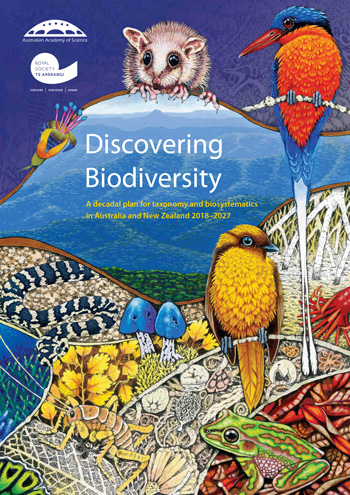Global S&T Development Trend Analysis Platform of Resources and Environment
| Attenborough supports plan to capture Australia’s biodiversity | |
| admin | |
| 2018-04-27 | |
| 发布年 | 2018 |
| 语种 | 英语 |
| 国家 | 澳大利亚 |
| 领域 | 资源环境 |
| 正文(英文) |
Naturalist, broadcaster and Fellow of the Australian Academy of Science, Sir David Attenborough, is endorsing calls for greater support for the scientists who study and name Australia’s plants and animals and other organisms, declaring that Australia’s current capacity is not adequate for the magnitude of the task. Sir David says that at the very time that many species are under greatest threat, funding and other resources allocated to discovering and documenting species are declining. “This has serious consequences for the future of life on Earth,” he says in the foreword to the Australian Academy of Science and the Royal Society Te Apārangi’s 10-year plan for taxonomy and biosystematics, to be launched today at Parliament House, Canberra. Australia has extraordinarily high levels of biodiversity. It is one of only two developed countries with ‘megadiversity’ of plant and animal life. However, of the more than 600,000 predicted species in Australia, only 30% have so far been discovered, documented and named. If Australia doesn’t change its approach to documenting our biodiversity, it is likely to take about 400 years to document every plant, animal and other species. In that time, many will go extinct. A sound understanding of biodiversity is critical, particularly as Australia seeks to achieve both environmental and economic sustainability in the face of rapid environmental change and an extinction crisis that threatens to change the face of Earth. Taxonomy and biosystematics—the disciplines of biology that discover, document, name and classify species—provide the framework for this much needed sound understanding of life on our planet. Taxonomists literally name the living world. The Academy’s 10-year plan was developed by an expert working group led by Australian plant taxonomist, Dr Kevin Thiele. He says Australia discovers and names around 2,500 new species per year—more than almost any other country in the world. Technological revolution
“A substantial increase in the current rate is possible if taxonomists and biosystematists are properly supported to take advantage of the technological revolution underway, in areas such as genomics, machine learning and 3D imaging, which would help speed up the mapping of our unique biodiversity,” Dr Thiele said. “With careful planning and adequate capacity building, Australia could embark on a ‘hypertaxonomy’ program—we could completely document our biodiversity in a generation. This would put us at the global leading edge—and as the only developed nation in the world that is also biologically megadiverse, this is where we should be.” “Documenting our biodiversity is important—for conservation, biosecurity, agriculture, human and animal health, and to understand the evolution of life on Earth,” Dr Thiele said. President of the Australian Academy of Science, Professor Andrew Holmes, acknowledged that the plan was ambitious in scope. “Australia and New Zealand are currently world leaders in managing and deploying biodiversity knowledge. This plan seeks to ensure that this leadership is not lost,” Professor Holmes said. “With the appropriate investment and support from government, industry and society we can ensure that future generations, and the community at large, are able to enjoy and celebrate the unique value and immense potential of the plant and animal life in our country.” The Academy would like to acknowledge the support of the Ian Potter Foundation in the development of ‘Discovering Biodiversity: A decadal plan for taxonomy and biosystematics in Australia and New Zealand 2018–2027’ on behalf of the Australian Academy of Science and the Royal Society Te Apārangi. Mosquitoes and marine spongesMosquitoes and marine sponges highlight the need for enhanced support for taxonomy. Mosquitoes cause more human deaths than any other animal on earth, yet there are an estimated 200 Australian species that have not yet been named or studied. Some of these may carry serious diseases, but we cannot assess this risk unless they are properly documented. Marine sponges are extremely rich in compounds that are leading to new drugs and other pharmaceuticals, including new antibiotics that will be needed to help deal with multi-drug-resistant diseases. An estimated 3,000 more species are known but have not yet been documented, and many more await discovery. Any one of these species may provide a drug that saves human lives. |
| URL | 查看原文 |
| 来源平台 | Australian Academy of Science |
| 文献类型 | 新闻 |
| 条目标识符 | http://119.78.100.173/C666/handle/2XK7JSWQ/113655 |
| 专题 | 资源环境科学 |
| 推荐引用方式 GB/T 7714 | admin. Attenborough supports plan to capture Australia’s biodiversity. 2018. |
| 条目包含的文件 | 条目无相关文件。 | |||||
| 个性服务 |
| 推荐该条目 |
| 保存到收藏夹 |
| 查看访问统计 |
| 导出为Endnote文件 |
| 谷歌学术 |
| 谷歌学术中相似的文章 |
| [admin]的文章 |
| 百度学术 |
| 百度学术中相似的文章 |
| [admin]的文章 |
| 必应学术 |
| 必应学术中相似的文章 |
| [admin]的文章 |
| 相关权益政策 |
| 暂无数据 |
| 收藏/分享 |
除非特别说明,本系统中所有内容都受版权保护,并保留所有权利。
修改评论